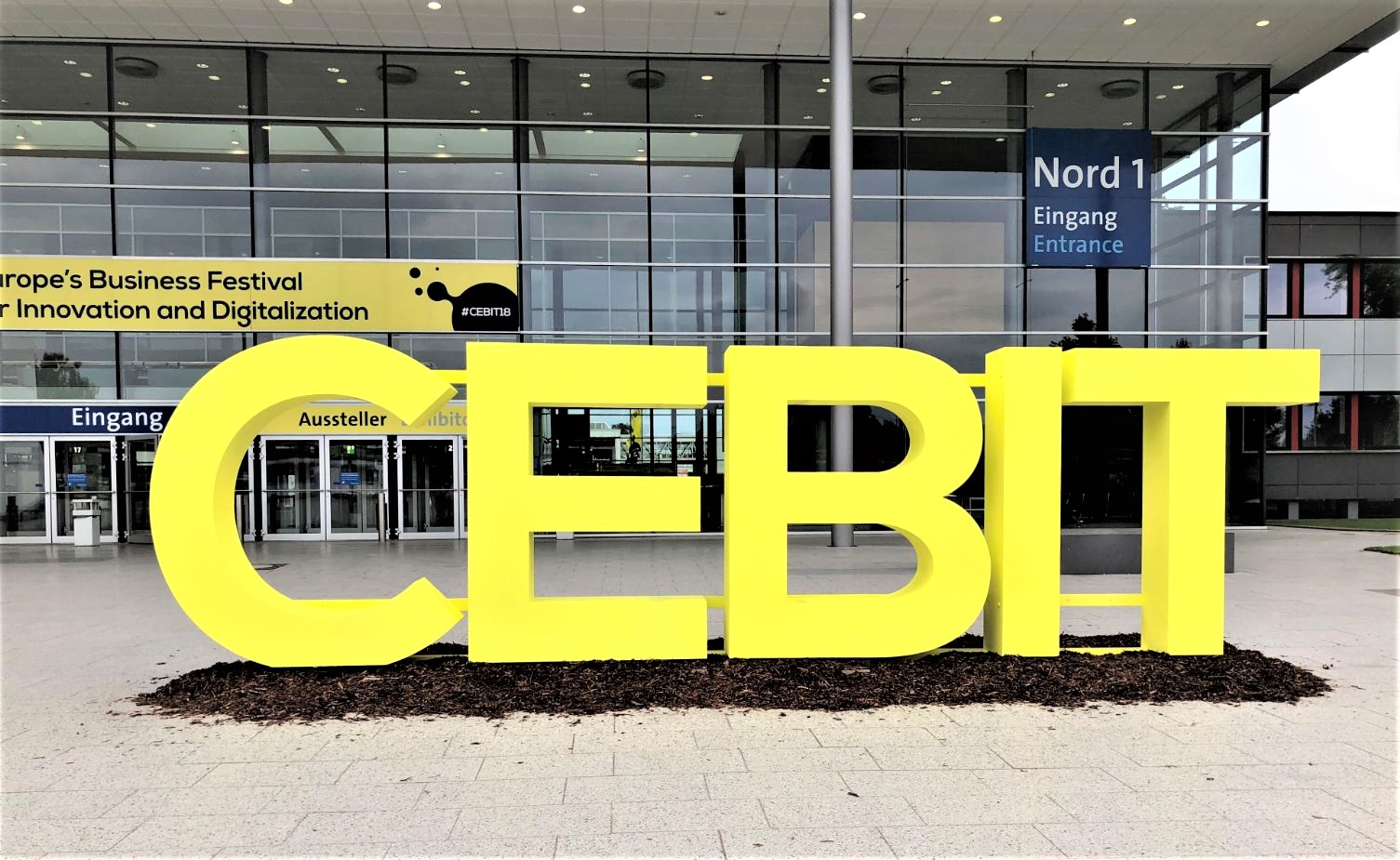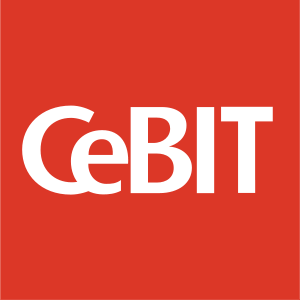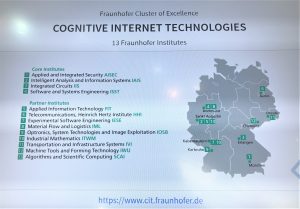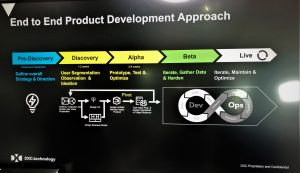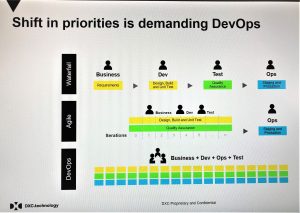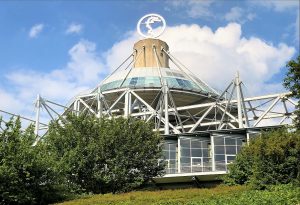Die CEBIT hat sich neu erfunden
Seit 1970 findet die CeBIT regelmäßig – in den ersten Jahren als einzelne Ausstellungshalle, ab 1986 als eigenständige Messe – jeweils im Frühjahr auf dem Messegelände Hannover statt. Ursprünglich aus der Bezeichnung “Centrum der Büro- und Informationstechnik” entstanden, entwickelte sich die CeBIT im Laufe der Jahrzehnte zur der weltweit größten Messe für Informationstechnik.
2018 sollte ein Neuanfang gewagt werden, da sich seit den Boomjahren um 2000 die Besucherzahlen kontinuierlich verringert hatten. Deshalb wurde der Messetermin vom Frühjahr in den Juni verlegt das Messekonzept seitens des Veranstalters, der Deutsche Messe AG, umfassend geändert.
Im Gegensatz zum alten Konzept setzte der Veranstalter der “Neuen CEBIT” auf parallele Veranstaltungen und Konferenzen, sowie Outdoor-Festival- und interaktiven Event-Charakter, mit den Schwerpunkten:
- Digitale Transformation
- Digitalisierung der Geschäftsmodelle
- Neue, geschäftsrelevante Technologien
Daher haben wir auch einen Vorschlag, der die Wichtigkeit der ICT-getriebenen Innovation & Transformation in Mitteleuropa dokumentieren sollte:
“CEBIT = Central European Business Innovation & Transformation”
Highlights der Digital-Messe
Die Fraunhofer-Gesellschaft (FhG) stellte sein “Cluster of Excellence” für das Thema Cognitive Internet Technologies, bestehend aus 13 Instituten, vor.
Diskussion am FhG-Messestand, Fraunhofer-Cluster of Excellence Cognitive Internet Technologies, mit:
- Prof. Dr. Claudia Eckert, Fraunhofer-Institut für Angewandte und Integrierte Sicherheit AISEC,
- Prof. Dr. Stefan Wrobel, Fraunhofer-Institut für Intelligente Analyse- und Informationssysteme IAIS,
- Prof. Dr. Albert Heuberger, Fraunhofer-Institut für Integrierte Schaltungen IIS und
- Prof. Dr. Boris Otto, Fraunhofer-Institut für Software- und Systemtechnik ISST.
BizDevOps
DXC-Technology mit dem agilen Produktentwicklungsansatz “Biz-Dev-Ops”
BizDevOps reicht weiter und bezieht die Fachbereiche von Anfang an mit ein …
IBM
IBM mit Zukunftsthemen, u.a. wie Artificial Intelligence (AI), Quantum Computing, High-Performance-Computing (HPC) und Blockchain
Zukunftweisenden Business-Themen im IBM-Pavillon, unter dem Motto: “Let’s put smart to work”
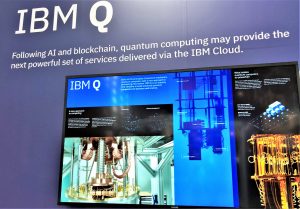 #Nextgen #CEBIT #innovation #Hannover #cebit18 #AI #artificialintelligence
#Nextgen #CEBIT #innovation #Hannover #cebit18 #AI #artificialintelligence
#ML #machinelearning #innovative #KI #cebit2018
Die CEBIT muss sich zukünftig erst noch beweisen
“The new CEBIT rocks …”
Bleibt zu hoffen, dass die Akzeptanz bei der Industrie zukünftig gegeben ist.
Weitere Informationen unter: www.cebit.de
CEBIT has reinvented itself
Since 1970 CeBIT has been held regularly – in the first years as a single exhibition hall, from 1986 as an independent trade fair – each spring at the Hannover Exhibition Grounds. Originally named the “Centre of Office and Information Technology”, CeBIT has developed over the decades into the world’s largest trade fair for information technology.
In 2018 a new beginning should be dared, because since the boom years around 2000 the numbers of visitors had decreased continuously. For this reason, the organiser, Deutsche Messe AG, has comprehensively changed the trade fair schedule from spring to June. In contrast to the old concept, the organizer of the “New CEBIT” focused on parallel events and conferences, as well as outdoor festival and interactive event character, with the emphasis: Digital transformation – digitization of business models and new, business-relevant technologies.
Therefore, we also have a proposal to document the importance of ICT-driven innovation & transformation in Central Europe: “CEBIT = Central European Business Innovation & Transformation”
Highlights of the Digital Fair
The Fraunhofer-Gesellschaft (FhG) presented its “Cluster of Excellence” for Cognitive Internet Technologies, consisting of 13 institutes, at a press conference at the FhG booth. Participants in the discussion were the Fraunhofer Cluster of Excellence Cognitive Internet Technologies:
- Prof. Dr. Claudia Eckert, Fraunhofer Institute for Applied and Integrated Security AISEC,
- Prof. Dr. Stefan Wrobel, Fraunhofer Institute for Intelligent Analysis and Information Systems IAIS,
- Prof. Dr. Albert Heuberger, Fraunhofer Institute for Integrated Circuits IIS and
- Prof. Dr. Boris Otto, Fraunhofer Institute for Software and Systems Engineering ISST.
DXC with the agile product development approach “Biz Dev Ops”
Here BizDevOps approach by DXC technology goes further and involves the specialist departments from the outset, so that all relevant stakeholders are involved in an E2E process, i.e. from development to operations.
IBM with future topics
… such as Artificial Intelligence (AI), Quantum Computing, High-Performance-Computing (HPC) and Blockchain. Future-oriented business topics were exhibited in the IBM pavilion under the motto: “Let’s put smart to work”.
CEBIT has yet to prove itself: “The new CEBIT rocks …”
It remains to be hoped that acceptance by industry will be assured in the future.
Further information
available at: www.cebit.de


